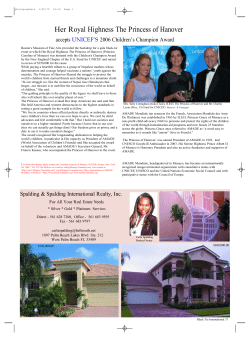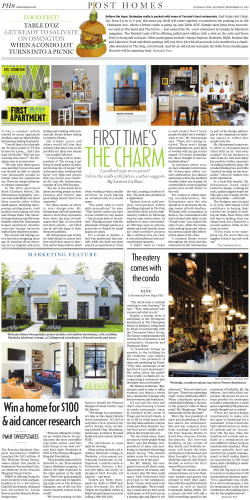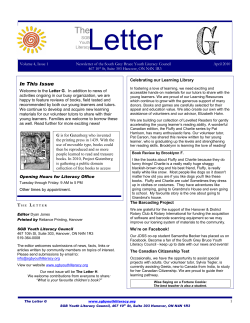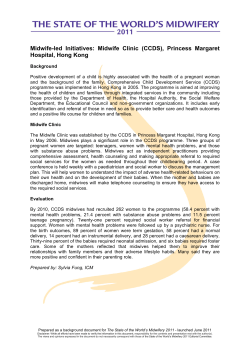
AMADE MONDIALE 50 ANNIVERSARY 1963-2013
AMADE MONDIALE 50th ANNIVERSARY 1963-2013 PRESS KIT TABLE OF CONTENTS A MESSAGE FROM H.R.H. THE PRINCESS OF HANOVER 3 OVERALL PRESENTATION History 4 Vision, mission statement & core values 6 International network 7 H.R.H. THE PRINCESS OF HANOVER, PRESIDENT 8 MAJOR PROGRAMS Philippines, Democratic Republic of the Congo: Care and social reinsertion for street children 9 Burundi: Community care for orphans and vulnerable children 10 Niger, Chili: Fight against the forgotten diseases 15 TESTIMONIES 17 PHOTOS 18 USEFUL DETAILS 19 2 A MESSAGE FROM H.R.H. THE PRINCESS OF HANOVER 3 OVERALL PRESENTATION HISTORY The World Association of Children’s Friends (Association Mondiale des Amis de l’Enfance - AMADE) was funded in June 1963 in accordance with the wish of the Princess Grace of Monaco, concerned by the protection of neglected children. The Princess Grace got involved to gather around Her several people of good will and high-rank personalities – such as H.R.H. Archduke Otto von Habsburg – to create a charity with a new approach and analysis on the threats children had to face in the early 1960ies. From the Principality of Monaco, AMADE quickly accessed an international recognition by developing its network of local affiliates, first in Europe, then in North Africa and Central Africa during the following years. In the early 1970ies, the association will get consultative status with UNICEF, UNESCO and ECOSOC, as well as participative status with the Council of Europe. During the years 1970 and 1980, AMADE’s action will essentially expand through an ethical and intellectual process, and awareness activities focused on issues such as the protection of children in armed conflicts, struggle against prostitution of children and sexual tourism, or bioethics and the rights of the child. April 1993 will be a cornerstone with H.R.H. The Princess of Hanover becoming the President of AMADE Mondiale. 4 Following Her momentum, AMADE will give priority to development actions; within a few years, its field interventions will notably increase, especially in the areas of health and education. From 1997 to 2002, AMADE got involved together with UNICEF in a wide program to fight against nutritional blindness on the African continent, benefiting over 7 million children in Mali, Cameroon and Mauritania. In 2003, H.R.H. The Princess of Hanover was appointed UNESCO goodwill Ambassador for the education of young girls and women. In Asia and Africa, AMADE created informal school structures to allow access to education for out-of-school children, living or working in the streets. In Laos, the NGO promotes training of local surgeons to operate children suffering from facial malformation. In Burundi, after a decade of civil war, AMADE supports the local communities to ensure care for more than 30 000 orphans and vulnerable children. Today AMADE is one of the key actors of international solidarity in the Principality of Monaco AMADE is one of the NGOs members of the Monaco Collectif Humanitaire, with the support of Monaco’s International Cooperation Division. Created in 2008 on the occasion of the 50th birthday of H.S.H. Prince Albert II, the Collectif’s first goal is to operate in Monaco children whose pathologies cannot be treated in their home countries. To date, 139 children, coming from 18 developing countries, have received successful surgery and treatment from this program. AMADE is also a member of the Monaco Collectif Haïti, created after the earthquake of 12 January 2010 to bring a more efficient answer to this major disaster. The efforts of the Collectif have led to the building of a primary school in Port-au-prince - with a capacity of 400 pupils - that officially opened its doors in September 2012. Since the year 2000, the activities initiated or supported by AMADE have led to the following results: Over 66 000 children have benefited from educational support and accessed regular scholarship 5 500 children and young family leaders have been professionally trained and received help for professional insertion and job research Over 50 000 children had access to adapted health care. 3 200 street children have been fostered, cared and reunified with their family or socially reintegrated in a long-term way. The fundamental rights of more than 10 000 children have been protected and preserved. Over 4 million Euros have been used directly to concrete child-advocacy activities 5 VISION AMADE is based on a vision: the vision of a world where every child, whatever his social, religious or cultural origins are, would have the capacity to live with dignity and security, his fundamental rights fully respected. The vision of a world where every child would have the opportunity to fulfill his potential. To achieve this goal, AMADE actively commits to the protection and blossoming of worldwide children. MISSION STATEMENT The funding bases of AMADE's involvement are the Convention on the Rights of the Child (UNCRC) adopted by the United Nations in 1989, and the Millennium Declaration adopted in 2000 by the international community to fight against poverty. AMADE contributes to implement these commitments through the following missions: To protect the most vulnerable children from violence, exploitation or abuse. To promote blossoming of children by contributing to access to education and health. To accompany changes through plea initiatives. CORE VALUES As a development charity, AMADE aims to bring perennial and innovative responses to the issues it is contronted with, giving priority to the reinforcement of the capacities and the self-sufficiency of the beneficiaries. The child may be its main preoccupation, AMADE's concern also includes his community. AMADE allows a specific importance to the respect of equality of chances, especially by fighting against gender discriminations. To get involved for childhood is a responsibility that implies expertise as well as moral and human values. The trust testified by the donors requires the strongest transparency, not only regarding financial management, but also concerning the selection, follow-up and evaluation of supported projects. It is AMADE's approach to give priority to the relationships based on partnership. 6 INTERNATIONAL NETWORK AMADE organizes its intervention through a network of 12 local affiliates and selected partners over 4 continents: South America, Europe, Asia and Africa. AMADE international presence - 2013 In Chile, AMADE provides thirty children suffering from metabolic diseases with medical and educational support, by helping their family to have access to appropriate treatment and food, and by promoting a better knowledge of the diseases. In Lithuania, the association works since 1992 to secure secondary education and professional training to out-ofschool teenagers with social issues. Through a specific approach and much attention, AMADE’s teachers and workers contribute to give these young adults a chance to become self-sufficient and responsible citizens. In the Philippines, AMADE supports the work of the Virlanie Foundation for thousands of children and families living in Manila’s streets. The Foundation’s activities include foster care, residential programs, access to basic health and hygiene, access to education or professional training, appropriate psychological support considering each child’s situation. The main purpose remains to reunify the children with their family whenever possible. In Burundi, the efforts of AMADE contribute to ensure proper care for more than 30 000 orphans and vulnerable children, severely affected by the civil war and AIDS pandemic. AMADE works through a community network composed of guardian families, joined in solidarity groups, present on both rural and urban areas. The activities developed embrace access to healthcare and education, psychosocial assistance and defense of property rights of the children. The very first objective is to reinforce the families’ financial capacities through microcredit and income-generating activities. 7 H.R.H. THE PRINCESS OF HANOVER, PRESIDENT Her Royal Highness the Princess of Hanover (born Princess Caroline of Monaco) is the President of AMADE Mondiale since 1993. Her Royal Highness always cared to commit in the defense of the most vulnerable and unprivileged children of the world. In Her capacity as President of AMADE Mondiale, H.R.H. The Princess of Hanover completed several field visits to raise awareness of rights of the children, healthcare and education issues on an international level. In 2004, in the Philippines, the Princess of Hanover met with the neglected street children and the young mothers of Manila; She exchanged with President Gloria Arroyo and local authorities about the situation of imprisoned young children. In February 2007, the Princess of Hanover made a two-week journey across the African continent, to visit Niger, Burundi, Democratic Republic of the Congo and South Africa. The Princess of Hanover completed a second visit in Niger in 2009, dedicated to access to education in the arid areas and efforts against sickle-cell anemia. Recently, in June 2013, the Princess of Hanover travelled to Democratic Republic of the Congo to meet Kinshasa’s street children and exchange views with the local actors involved in child protection. Watch the video report made by Monaco Info on http://www.youtube.com/watch?v=dU3aK1toCUI H.R.H. The Princess of Hanover is UNESCO Goodwill Ambassador for the education of young girls and women since 2003. She received the UNICEF Children’s Champion Award in May 2006, as well as the Menschen in Europa Award in December 2011, in recognition for Her commitment toward deprived children. Read the official biography of H.R.H. the princess of Hanover on www.palais.mc 8 MAJOR PROGRAMS PHILIPPINES, DEMOCRATIC REPUBLIC OF THE CONGO CARE AND SOCIAL REINSERTION FOR STREET CHIDLREN The number of children living and/or working in the streets throughout the world is now estimated to several dozen millions1 – a number which is hard to define more because of the lack of official data and the difficulty to delimit the phenomenon. If causes are multiple and vary depending on countries and local situations, consequences remain the same for children exposed to violence, drugs, prostitution and exploitation. AMADE struggles in South-East Asia and Africa to support local initiatives to assist the street children. Philippines - Partnership with the Virlanie Foundation There would be over 1,5 million of Filipino children and teenagers living in the street – 100 000 for the sole capital Manila. These children receive no education, health care or appropriate food. Without reference, frameless, they just fight for survival day after day. Some of them manage to make it through little jobs. Others take refuge into drugs, or join street gangs. The approach of Filipino authorities is too often to incarcerate children, in unacceptable conditions, no matter how young they are. A concerning situation for a country where 53% of the population is less than 25 years old… 1 Source: UNICEF – The state of the world’s children 2012 9 Since 1993, the Virlanie Foundation works actively to foster and accompany unprivileged children living in the poorest areas of Manila, and give them every chances for a better future. AMADE supports Virlanie’s activities since 1995 through a series of programs, both outreach and residential, conceived to temporarily shelter the children and try to reunify them with their family. One of them, the Open Day Center is a day shelter where families living in the streets can find social, medical, educational and legal services. The center’s staff introduces the children to a structured social and family life, far away from the streets rules. ODC is a refuge-place, where families can take control of their life back; the center provides them with financial help, administrative assistance, scholar and medical support. Among the residential structures of the Foundation, the Jade homes are places of specific and adapted care for children suffering from disabilities, whether physical and/or mental. A staff composed of teachers and social workers gives them the care and affection they need. Jade homes provide medical care, psychological follow-up and appropriate food, as well as recreational and developing activities. The Sibuhi center for creativity and development is focused on allowing children to freely express their feelings in an artistic and creative way. Many studies proved that children who can express and develop their potential have a better self-esteem, and frequently reveal capacities and talents in many areas. The center organizes sports, arts and musical activities for its young beneficiaries coming from the streets. The Foundation supervises a total of 24 care programs for street children; 12 being residential and 12 being outreach-oriented. In 2012, Virlanie’s actions benefited over 1 200 street children; more than 400 of them have been fostered in residential programs. 69 were successfully reunified with their family. Read more on www.virlanie.org 10 DEMOCRATIC REPUBLIC OF THE CONGO - SUPPORT OF YOUNG “WITCH-GIRLS” In a country where 87% of the population live with less than 2 $ a day, the number of children living in Kinshasa’s streets is estimated over 20 000 – in a city with 10 million inhabitants. The increasing number of children ending up in the streets of the capital is partially explained by a preoccupying phenomenon: the “witch children”. Poverty, lack of basic services, diseases, loss of a job, death of a relative… have become reasons for which many families accuse their own children of witchcraft. The “symptoms” revealing the “evil” nature of a child are numerous and especially adjustable to the circumstances: agitation, impudence, sleeping troubles, handicap, epilepsy, fever, lasting disease hard to cure… The child gets perceived as a threat and a burden, of which parents try to get rid. Deeply fixed in minds, this conviction reveals the fear some parents feel towards their own children, that they hold responsible for the difficulties they have to deal with and the toughness of their lives. The "witch children" have lost their child status to become demons, evil flesh-eating creatures, dangerous for their relatives… This belief is also maintained by local pastors and prophets, whether of good and bad faith, being the only ones able to detect and officially diagnose the status of witch thanks to their “clairvoyance gift”. Dealing with a broken social link, the evangelist sects are constantly increasing. Now there would be over 7 000 Churches in the sole capital Kinshasa. Preachers have become the source of the spiritual comfort so many families need. They create their own demand by encouraging witchcraft accusations, then making money out of the ceremonies of exorcism and spiritual treatment. Accusations and confessions are most of time public. Confession often comes after a very organized ritual including threats, whipping, violence, burns… Invocations and prayers compete the ceremony, if paid for them. This is one of the reasons why the children live in fear and defiance - so much that the street and its dangers start to look like a better alternative. Some of them even claim that witch position, so they can use it like a threat to protect themselves and take control of their life back. By considering themselves as cannibalistic witches, they can escape the life in the streets and the threats they have to overcome. 11 More than 50% of the street children appear to be young girls aged 9 to 17 years old, forced to prostitute for survival. These young girls are extremely vulnerable in a moral, affective, psychological, alimentary and educative way. Many local associations fight day after day against this phenomenon, to make the mentalities evolve. Created at the end of the 90ies, the Réseau des Educateurs des Enfants et Jeunes de la Rue (REEJER), with the support of Auteuil International, partner of AMADE Mondiale, is a platform that coordinates more than 160 bodies active for Kinshasa's street children. Their activities include public awareness, lobbying to local authorities, prevention and mediation with the families, social care (education, healthcare) and socio-professional reinsertion of the children. Among these local efforts, AMADE Mondiale chose to support the Vivre et Travailler Autrement (VTA) center (To live and work in another way) that provides accommodation, care, professional and family reinsertion for young street deprived girls aged 6 to 18 years old. The support of AMADE includes global care for 30 young girls fostered in the centre, as well as an educational assistance for 17 girls reintegrated with their family. AMADE Mondiale's commitment follows the journey of H.R.H. The Princess of Hanover in Kinshasa from 6 to 8 June 2013. The President of AMADE Mondiale met with several local stakeholders around street children, and shared some special moments with the beneficiaries. 12 BURUNDI COMMUNITY CARE FOR ORPHANS AND VULNERABLE CHILDREN There are currently more than 800 000 orphans and vulnerable children (OVC) living in Burundi – around 10% of the population. This is a direct result of the civil war that devastated the country during more than 10 years. Besides, Burundi is still strongly touched by the AIDS-HIV pandemic, despite many efforts accomplished on a national basis: in 2011, almost 100 000 people were living with HIV, 20 000 of them being children under the age of 15. 120 000 children were orphaned due to AIDS that same year. The OVC have no access to basic services such as medical care, hygiene or regular schooling. As a reminder, Burundi is ranked 178th over 187 countries according to the human development index set by UNDP for 2012. To face this situation, AMADE Burundi has an integrated approach whose goal is to contribute to improve OVC’s care by their own community, focusing on traditional solidarity and mutual assistance values. For the past 20 years, the AMADE has been supporting the families of guardians and relatives taking care of one or more orphans. The association’s work is accomplished through the following areas: Reinforcement of the families’ financial capacities: increasing the families’ resources allows them to take care of children’s needs with autonomy and durability. AMADE Burundi guides the families in developing income-generating activities to make sure they are as solid and profitable as possible. It also promotes the practice of savings within solidarity community groups, so their members can afford the cost of the children’s education all by themselves. Creation of community mutual health funds: AMADE Burundi supervises families to use the resources coming from income-generating activities into mutual health funds, in order to provide OVC with access to medical care and to support health expenses on their own. It works together with community groups, e.g. through awareness sessions and competences reinforcement, to create the health funds and make them feasible.. 13 In addition, AMADE Burundi partially supports the distribution of school supplies for over 30 000 orphans. It ensures professional training and insertion for family leader orphans who are out-of-school to take care of their brothers or sisters. The association also works to reduce HIV transmission from mother to child and to take care of people living with HIV. Its actions embrace prevention and awareness around family planning, contraception and sex education. It also promotes screening test and follow-up under PMTCT protocol of pregnant infected women, in order to make sure the baby is not infected during pregnancy, delivery and nursing. Finally, AMADE Burundi fights to improve access to a quality secondary education, especially through the building of a model secondary school with a capacity of 432 pupils – one third of them will be chosen among OVC coming from unprivileged families. The education will follow the national education course, with complementary and technical sessions selected after the priority needs of the country among the most promising fields in terms of access to job placement. The activities developed by AMADE Burundi and its network benefit each year over 50 000 people. 30 000 children benefit from its assistance regarding school supplies. Its medical and psychosocial support affects 10 000 people living with HIV. More than 30 000 guardians have joined the community solidarity groups for OVC care. Read more on www.fvs-amade.org 14 NIGER, CHILI FIGHT AGAINST THE FORGOTTEN DISEASES Niger - Prevention and treatment of sickle-cell anemia Sickle-cell might be unknown, it is still the genetic disease the most widespread in the world, touching more than 50 million people. According to WHO’s evaluation, over 300 000 children are born every year with a severe congenital blood disorder. SCD is caused by a malformation of the red corpuscles, and is reflected in arterial disorders inducting strong pain attacks, cardiovascular and pulmonary issues. Sickle-cell is frequently responsible from development and breathing troubles for the children, as well as bone disorders, especially in the lower limbs. The disease has serious consequences for the child’s development, his schooling and blossoming, while being an important financial load for the families. Niger is one of the countries the most affected by the diseases, with a prevalence estimated between 18 abd 22% of the population in 2013 (around 3,5 million people), which makes it a real public health issue. With appropriate treatment and follow-up, people suffering from SCD can expect to have a regular life style, with the same life expectancy than a healthy person. AMADE joined the efforts of the local associations and authorities of Niger to contribute to develop an adapted medical care. This partnership led to the construction of a Reference Center for Sickle-Celle Anemia in Niamey – which opened its doors in January 2010. The Center’s missions include ambulatory, psychological and social care for drepanocytic people, treatment of the symptoms, professional training of medical staff, public information and awareness, and promotion of the medical research. Since its opening in January 2010, the Center had over 23 000 people admitted, among 7 000 children under the age of 5. During the sole year 2012, the Center’s staff performed more than 20 000 laboratory exams and blood tests, and contributed to a better understanding of the disease. 15 Chile - Treatment and education for children with inherited metabolic diseases Inherited metabolic diseases (IMD) are a group of rare genetic disorders in which the body is unable to metabolize amino acids consumed in the diet. Amino acids are the building blocks of proteins and are metabolized in order to provide energy or to make other needed compounds. The compounds that are not metabolized by the body in IMD accumulate, generating a wide range of symptoms. Inherited metabolic diseases, if not treated, can cause vomiting, cramps, severe convulsive crises, neurological damage and even death. An early diagnosis of the disease, together with the proper treatment and diet are key elements for these children to achieve a better quality of life, and even in many cases, normal development The high cost of the treatment and stress associated with the health condition of children with IMD impact the quality of life of the whole family. Also, many of these disorders, due to their low prevalence, lack government or insurance coverage for the acquisition of drugs and specialized formulas that they require. This leaves low income families in a situation where they cannot guarantee the survival of their children. Since the year 2007, AMADE Chile - in collaboration with AMADE Mondiale - has been working to ensure access to treatment for children with IMD that come from low income Chilean families. It has also worked to offer information and education regarding IMD to families and health professionals Between 2007 and 2013, AMADE Chile has sponsored 35 children with IMD from low income families, allowing them to achieve normal metabolic levels, reducing cognitive and physical disability and vital organ damage, among other complications associated to these conditions. Since 2012 educational group activities have been developed for promoting the acquisition of information and skills by the families of children with IMD to ensure their proper development and better quality of life. More than 30 families of children with 7 different IMD have benefited from this educational activities. Read more on www.amadechile.cl 16 TESTIMONIES BURUNDI Jean-Claude, orphan AMADE Burundi helped me and trained me for that sewing job. After the training, we have also received sewing machines and other material. Today I am grateful for AMADE because I no longer depend on anyone, and I can buy clothes and food on my own. Fidélité, 12 years old I am in 3rd year of school, and I thank AMADE for giving us uniforms and books we needed. A love mathematics, French and Kirundi lessons. I hope I will grow up to become a doctor. PHILIPPINES David, Manila street child fostered by Virlanie I have learned farm work, cooking and cleaning. I am determined to build a better future for myself and for the others. My parents see a real changing in me and they are really proud. CHILI Margarita, mother of 4-years-old Amaro, suffering from genetic disease The support we receive from AMADE is very important to us as it reduces in half the cost of the specific treatment and food that my son needs. AMADE also gave us the chance to meet and to exchange with other families and children suffering from the same disease, so we could share our experiences to learn how to live better with it. 17 PHOTOS You can receive the below pictures in high resolution upon request to AMADE Mondiale. Contact information Sébastien Besançon +377.97.70.52.60 [email protected] Journey of H.R.H. The Princess of Hanover in Kinshasa – June 2013 Journey of H.R.H. The Princess of Hanover in Niamey – February 2009 Filipino street children Burundian orphans and vulnerable children 18 USEFUL DETAILS Postal adress Telephone Fax Email Website 4 rue des Iris 98000 Monaco +377.97.70.52.60 +377.97.70.52.72 [email protected] www.amade-mondiale.org Personnalities H.R.H. The Princess of Hanover - President H.S.H. Prince Albert II of Monaco – Honorary President Board of Directors H.R.H. The Princess of Hanover H.E.Mr. Jean-Claude Michel Mr. Jérôme Froissart Mr. Jean-Paul Samba Mr. Pieter Bogaardt Mrs. Caroline Diemunsch-Repin Mr. Jean Kerwat Mrs. Spès Nihangaza Program coordinator Media coordinator Administrative assistant Mrs. Ana-Maria Hahn Mr. Sébastien Besançon Mrs. Allison Simian President Vice-President Secretary General Treasurer General .com/AMADEmondiale .com/AMADEmondiale .com/AMADEmondiale 19
© Copyright 2026









